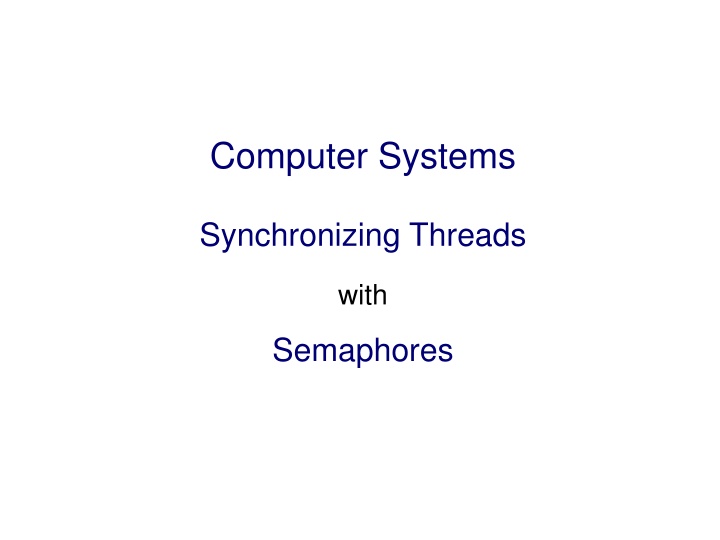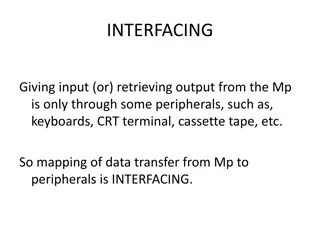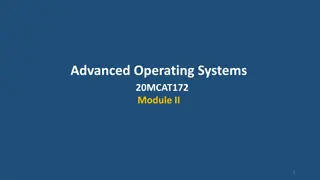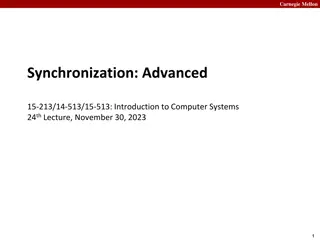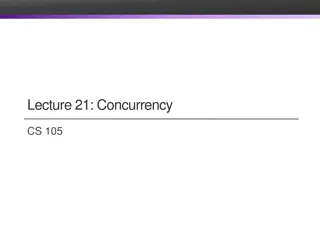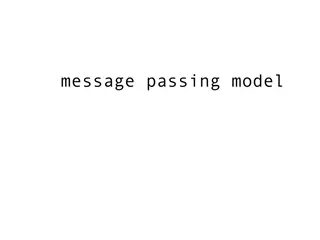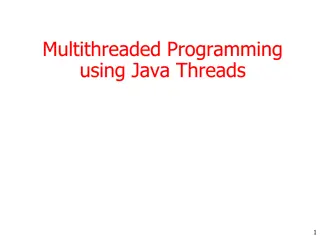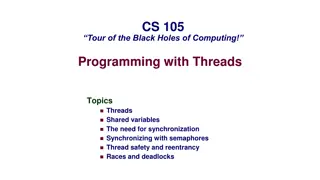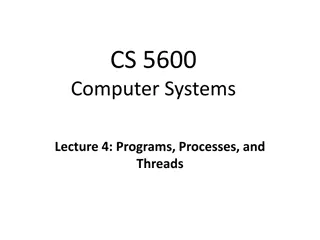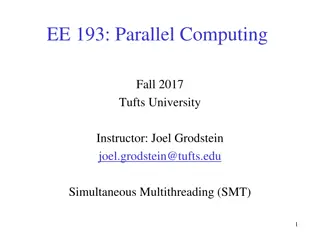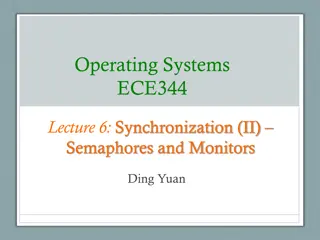Synchronizing Threads with Semaphores in Computer Systems
In computer systems, synchronizing threads with semaphores is crucial for preventing race conditions and ensuring proper access to shared data. This involves understanding critical sections, race conditions, and ways to manage multi-threaded processes effectively. The article discusses a code example highlighting the importance of mutual exclusion in thread execution and offers insights into handling the critical-section problem.
Download Presentation

Please find below an Image/Link to download the presentation.
The content on the website is provided AS IS for your information and personal use only. It may not be sold, licensed, or shared on other websites without obtaining consent from the author.If you encounter any issues during the download, it is possible that the publisher has removed the file from their server.
You are allowed to download the files provided on this website for personal or commercial use, subject to the condition that they are used lawfully. All files are the property of their respective owners.
The content on the website is provided AS IS for your information and personal use only. It may not be sold, licensed, or shared on other websites without obtaining consent from the author.
E N D
Presentation Transcript
Computer Systems Synchronizing Threads with Semaphores
Recap: Multi-Threaded Processes Process Process Thread Thread Thread Thread Memory Memory Heap Heap Stack Stack Stack Stack Data Data Code Code single-threaded multi-threaded
Recap: badcnt.c #define NITERS 1000000 /* thread routine */ void * Count(void *arg) { int i; for (i=0; i<NITERS; i++) cnt++; return NULL; } unsigned int cnt = 0; /* shared */ int main() { pthread_t tid1, tid2; pthread_create(&tid1, NULL, Count, NULL); pthread_create(&tid2, NULL, Count, NULL); linux> ./badcnt BOOM! cnt=1988411 pthread_join(tid1, NULL); pthread_join(tid2, NULL); linux> ./badcnt BOOM! cnt=1982618 if (cnt != (unsigned)NITERS*2) printf("BOOM! cnt=%d\n", cnt); else printf("OK cnt=%d\n", cnt); } linux> ./badcnt BOOM! cnt=1982696 cnt should be equal to 2,000,000. What went wrong?!
Recap: Race Conditions Assume that two threads execute concurrently cnt++; /* cnt is global shared data */ One possible interleaving of statements is: R1 = cnt R1 = R1 + 1 Timer interrupt! R2 = cnt R2 = R2 + 1 cnt = R2 Timer interrupt! cnt = R1 Race condition: The situation where several threads access shared data concurrently. The final value of the shared data may vary from one execution to the next. Then cnt ends up incremented once only!
Recap: Critical Sections Blocks of code that access shared data: /* thread routine */ void * Count(void *arg) { int i; for (i=0; i<NITERS; i++) cnt++; return NULL; } Threads need mutual exclusive access to critical sections: two threads cannot simultaneously execute cnt++
The Critical-Section Problem Critical section (CS): block of code that uses shared data CS problem: correctness of the program should not depend on one thread reaching a certain point before another thread CS solution: allow a single thread in the CS at one time while(1) Thread Ti { entry section Critical Section (CS) exit section } Remainder Section (RS)
while(1) { Thread T1 entry section Critical Section (CS) exit section } Remainder Section (RS) If T1 is in CS, T2 should be outside of CS and the other way around while(1) { Thread T2 entry section Critical Section (CS) exit section } Remainder Section (RS)
Solving the CS Problem - Semaphores (1) A semaphore is a synchronization tool provided by the operating system A semaphore S can be viewed as an integer variable that can be accessed through 2 atomic operations: DOWN(S)also known aswait(S) UP(S) also known assignal(S) Atomic means indivisible. When a thread has to wait, put it in a queue of blocked threads waiting on the semaphore
Semaphores (2) In fact, a semaphore is a structure: struct Semaphore { int count; Thread * queue; /* blocked threads */ }; struct Semaphore S; /* global variable */ S.countmust be initialized to a nonnegative value (depending on application)
OS Semaphores DOWN(S) or wait(S) When a process must wait for a semaphore S, it is blocked and placed on the semaphore s queue DOWN(S): <disable interrupts> S.count--; if (S.count < 0) { block this thread place this thread in S.queue } <enable interrupts> Threads waiting on a semaphore S: S.queue T3 T1 T5
OS Semaphores UP(S) or signal(S) TheUPorsignal operation removes one thread from the queue and puts it in the list of ready threads UP(S): <disable interrupts> S.count++; if (S.count <= 0) { remove a thread T from S.queue place this thread T on Ready list } <enable interrupts> S.queue T3 T1 T5 Ready queue T7 UP(S)
OS Semaphores - Observations WhenS.count >= 0 - the number of threads that can execute wait(s)without being blocked is equal to S.count WhenS.count < 0 - the number of threads waiting on S is equal to |S.count| Atomicity and mutual exclusion - no two threads can be in wait(S)andsignal(S)(on the same S) at the same time - the blocks of code defining wait(S)andsignal(S) are, in fact, critical sections
Using Semaphores to Solve CS Problems Thread Ti: DOWN(S); <critical section CS> UP(S); <remaining section RS> To allow only one thread in the CS (mutual exclusion): - initialize S.countto ____ To allow n threads in the CS, for some n > 1: - initialize S.countto ____
Solving the Earlier Problem /* Thread T1 routine */ /* Thread T2 routine */ void * Count(void *arg) { int i; void * Count(void *arg) { int i; for (i=0; i<10; i++) { for (i=0; i<10; i++) { R1 cnt R1 R1+1 cnt R1 R2 cnt R2 R2+1 cnt R2 cnt++; cnt++; } return NULL; } } return NULL; } Solution: use Semaphores to impose mutual exclusion to executing cnt++
Solving the Earlier Problem Semaphore mutex; 1 /* Thread T1 routine */ /* Thread T2 routine */ void * Count(void *arg) { int i; void * Count(void *arg) { int i; for (i=0; i<10; i++ { DOWN(mutex); cnt++; UP(mutex); } return NULL; } for (i=0; i<10; i++) { DOWN(mutex); cnt++; UP(mutex); } return NULL; }
Activity Understanding Semaphores What are possible values for g, after the two threads below finish executing? /* global shared variable */ int g = 10; Semaphore s = 0; Thread A g = g + 1; UP(s); g = g * 2; Thread B DOWN(s); g = g - 2; UP(s);
int g = 10; Semaphore s = 0; Thread A g = g+1; UP(s); R2 = g R2 = R2*2 g = R2 Thread B DOWN(s); R3 = g R3 = R3-2 g = R3 UP(s);
Using OS Semaphores Semaphores have two uses: - Mutual exclusion: making sure that only one thread is in a critical section at one time - Synchronization: making sure that T1 completes execution before T2 starts?
Synchronizing Threads with Semaphores Suppose that we have 2 threads: T1 and T2 How can we ensure that a statement S1 in T1 executes before statement S2 in T2? Semaphore sync; 0 Thread T1 Thread T2 S1; DOWN(sync); UP(sync); S2;
Activity Consider two concurrent threads T1 and T2. T1 executes statements S1 and S3 and T2 executes statement S2 Thread T1 Thread T2 S1 S2 S3 Use semaphores to ensure that the statements are always executed in the order S1, S2, S3
Review: Mutual Exclusion Semaphore mutex; 1 Thread T1 DOWN(mutex); critical section UP(mutex); Thread T2 DOWN(mutex); critical section UP(mutex);
Review: Synchronization T2 cannot begin execution until T1 has finished: Semaphore mutex; 0 Thread T1 Code for T1 UP(mutex); Thread T2 DOWN(mutex); Code for T2
Deadlock and Starvation Deadlock occurs when two or more threads are waiting indefinitely for an event that can be caused by only one of the waiting threads Let S and Q be two semaphores initialized to 1 Thread T1Thread T2 wait (S); wait (Q); ... wait (Q); wait (S); ... Starvation indefinite blocking - a thread may never be removed from the semaphore queue in which it is suspended
Hands-on Session POSIX semaphores - sem_init - sem_wait - sem_post - sem_getvalue - sem_destroy Fix the badcnt.c program to produce correct result
Recap Threads - Efficient, own stack, share global data Problem with Threads - Race conditions when accessing shared data Eliminating Races - Mutual Exclusion with Semaphores Thread Synchronization - Semaphores can be used to synchronize threads POSIX - Standard-based thread API for C and C++
